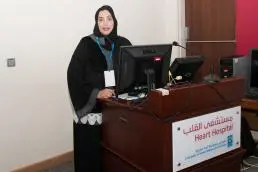PHOTO
Doha - Hamad Medical Corporation's (HMC) Occupational Health and Safety (OHS) Department recently organized the 2nd Conference of Radiation Safety in Interventional Cardiology to highlight the importance of ensuring radiation safety in interventional cardiology.
Interventional cardiology is a branch of cardiology that deals specifically with the catheter-based treatment of structural heart diseases. Procedures performed by specialists in interventional cardiology include angioplasty (an intervention for the treatment of coronary artery disease), valvuloplasty (dilation of narrowed cardiac valves), congenital heart defect correction, and coronary thrombectomy (involving the removal of the removal of a blood clot from the coronary arteries).
The one-day conference, organized by the radiation safety section in the OHS Department, in co-operation with the Cath-Lab at the Heart Hospital (member of HMC's network of hospitals), also encouraged radiation safety experts to correctly apply radiation protection principles in clinical practice.
More than 100 participants, comprising medical physicists, biomedical engineers and radiographers attended the symposium. There were three speakers at the symposium, which also focused on providing necessary information related to essential components of the safe use of fluoroscopic systems.
Fluoroscopy is an imaging technique that uses x-ray technology to obtain real-time moving images of the interior of an object. A fluoroscope allows a physician to see the internal structure and function of a patient, so that the pumping action of the heart or the motion of swallowing can be observed.
"The interventional cardiology procedures generally expose patients and staff to high radiation doses, especially from long time exposure to fluoroscopic substances, and due to greater number of images required to be captured during these procedures. This high exposure rate has raised concerns about the safety of patients and staff who administer such treatment on patients, which is why we are holding this educational event" said OHS Department's Executive Director, Dr Huda Al Naemi.
She explained that some precautions or measures such as organizing regular symposiums are necessary to equip radiation experts and staff with the right tools for preventing radiation hazard in general. "We can prevent radiation hazard by regularly discussing key preventive measures and also by organizing training for staff involved in radiation application about radiation protection techniques. We also need to find the best ways of minimizing radiation exposure to staff and patients."
Dr. Al Naemi noted that participants in the symposium are expected to have acquired a clear understanding of how to link academic knowledge with the actual practice of safe use of radiation and ensuring protection against radiation hazard in the healthcare delivery system.
"We hope all aspiring radiologists and cardiologists have taken advantage of the opportunity provided by this conference to learn from the best faculty in this field. As HMC strives to provide the safest, most effective and most compassionate care for each and every one of our patients, we at OHS are also making sure that the safety of all patients, as well as that of our staff, is our top priority, which is why holding symposium like this is essential to our work," Dr. Al Naemi added.
-Ends-
About HMC
HMC has been the principal public healthcare provider in the state of Qatar for over three decades and is dedicated to delivering the safest, most effective and compassionate care to all patients.
HMC manages eight hospitals, incorporating five specialist hospitals and three community hospitals. HMC also manages the National Ambulance Service as well as home and residential care, all accredited by Joint Commission International. While HMC continues to upgrade its facilities and services, it has also embarked on an ambitious expansion program, targeting the areas of need in our community.
HMC is leading the development of the region's first academic health system and is committed to building a legacy of healthcare expertise in Qatar. We collaborate with partners who are key experts in Qatar and beyond, including Weill Cornell Medical College-Qatar, the Institute for Healthcare Improvement and Partners Healthcare, Boston.
We are also the first hospital system in the Middle East to achieve institutional accreditation from the Accreditation Council of Graduate Medical Education - International (ACGME-I), which demonstrates excellence in the way medical graduates are trained through residency, internship and fellowship programs.
For more information please visit: www.hamad.qa or contact Noimot Olayiwola, Media Project Manager Tel: (00974) 44390945; Mobile: (00974) 55568709; Email: nolayiwola@hamad.qa
© Press Release 2015




















